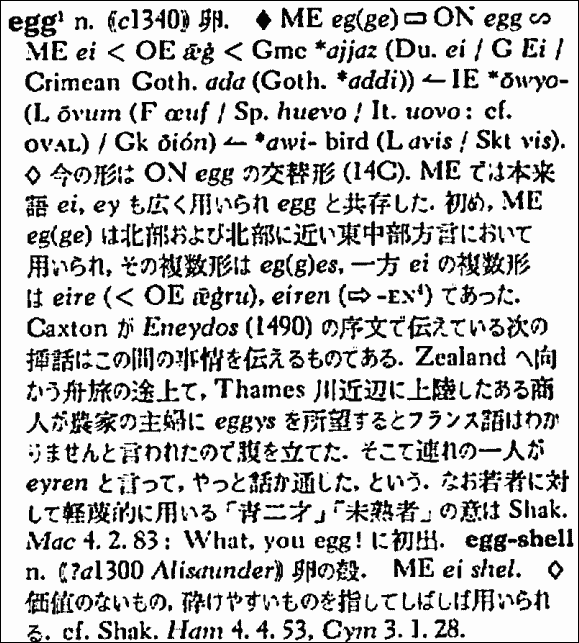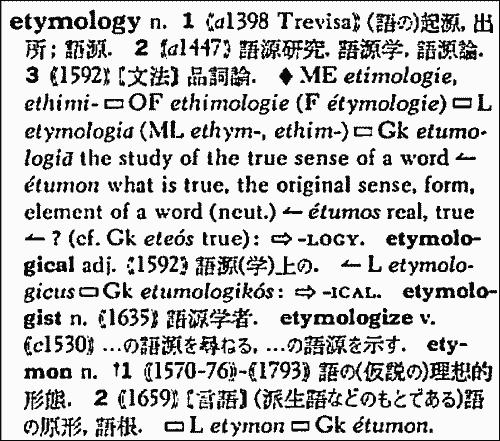2026-02-08 Sun
■ #6131. kangaroo の語源 --- 酒場語源の裏話 [etymology][loan_word][language_myth][folk_etymology][oed][australian_english]
kangaroo の語源については「#3048. kangaroo の語源」 ([2017-08-31-1]) で取り上げた.1770年の Captain Cook のオーストラリア到達の際に,原住民から返された "I don't know" に相当する表現に基づくものという説が流布してきた経緯がある.今では,この説は酒場語源(解釈語源,民間語源)と考えられている.
American Heritage Dictionary の Notes より,kangaroo の項より引用する.
Word History: A widely held belief has it that the word kangaroo comes from an Australian Aboriginal word meaning "I don't know." This is in fact untrue. The word was first recorded in 1770 by Captain James Cook, when he landed to make repairs along the northeast coast of Australia. In 1820, one Captain Phillip K. King recorded a different word for the animal, written "mee-nuah." As a result, it was assumed that Captain Cook had been mistaken, and the myth grew up that what he had heard was a word meaning "I don't know" (presumably as the answer to a question in English that had not been understood). Recent linguistic fieldwork, however, has confirmed the existence of a word gangurru in the northeast Aboriginal language of Guugu Yimidhirr, referring to a species of kangaroo. What Captain King heard may have been their word minha, meaning "edible animal."
OED の kangaroo (n.) の Notes も読んでみよう.
Cook and Banks believed it to be the name given to the animal by the Aboriginal people at Endeavour River, Queensland, and there is later affirmation of its use elsewhere. On the other hand, there are express statements to the contrary (see quots. below), showing that the word, if ever current in this sense, was merely local, or had become obsolete. The common assertion that it really means 'I don't understand' (the supposed reply of the local to his questioner) seems to be of recent origin and lacks confirmation. (See Morris Austral English at cited word.)
1770 The animals which I have before mentioned, called by the Natives Kangooroo or Kanguru. (J. Cook, Journal 4 August (1893) 224)
1770 The largest [quadruped] was calld by the natives Kangooroo. (J. Banks, Journal 26 August (1962) vol. II. 116)
1777 The Kangooroo which is found farther northward in New Holland as described in Captn Cooks Voyage without doubt also inhabits here. (W. Anderson, Journal 30 January in J. Cook, Journals (1967) vol. III. ii. 792)
1793 The animal..called the kangaroo (but by the natives patagorong) we found in great numbers. (J. Hunter, Historical Journal 54)
1793 The large, or grey kanguroo, to which the natives [of Port Jackson] give the name of Pat-ag-a-ran. Note, Kanguroo was a name unknown to them for any animal, until we introduced it.
. . . .
OED の上記引用でも要参照とされている Austral English については「#6110. Edward Ellis Morris --- オーストラリア英語辞書の父」 ([2026-01-18-1]) で触れたが,そこでも kangaroo の語源については詳しい考察と解説がなされている.I don't know 説については "This is quite possible, but at least some proof is needed . . . ." と述べられていることのみ触れておこう.
・ Morris, Edward Ellis, ed. Austral English: A Dictionary of Australasian Words, Phrases and Usages. London: Macmillan, 1898.
2026-01-20 Tue
■ #6112. OED の12月アップデートで日本語からの借用語が11語追加! [oed][borrowing][loan_word][japanese][lexicology][maltese][notice][tufs][world_englishes][maltese_english][world_englishes]

OED Online は,3ヶ月に一度アップデートされます.最新のアップデートは昨年12月のもので,西アフリカ,マルタ,日本,韓国という4つの地域からの借用語に焦点が当てられています.日本語からの借用語も11語含まれていました.
英語史や語彙論の観点から,それぞれのセクションを要約しつつ,コメントを加えたいと思います.まずは "From abeg to yassa: New words from West Africa" です.ナイジェリア,ガーナ,ガンビア,リベリア,シエラレオネといった国々からの借用語が紹介されています.例えば,ガーナの伝統的なダンス Adowa (1928) や,ナイジェリア英語の bend down (and) select (古着,または古着市場)などがエントリーされることになったとのことです.正直なところ私にとっては縁遠い語彙という印象が拭えません.しかし,これらの国々では英語が公用語やそれに準ずる言語として機能しており,独自の英語変種 (World Englishes) が豊かに育っているという事実を,再認識させられました.
次に "From aljotta to pastizz: New words from Malta" です.地中海の島国マルタの英語変種(Maltese English)からの語彙です.マルタ語 (Maltese) は,EU の公用語の中で唯一,セム語派 (Semitic) に属しながらラテン文字で表記される言語です.記事内に,次の記述があります.
Maltese is the only Semitic language written in the Latin alphabet and is the only Semitic and Afroasiatic language among the official languages of the European Union.
今回追加された pastizz (リコッタチーズや豆の入ったパイ)や aljotta (魚のスープ)などは,イタリア語やシチリア語の影響も色濃く反映しており,言語混交の歴史を感じさせます.マルタの言語事情については,「#2228. マルタの英語事情 (1)」 ([2015-06-03-1]) や「#2229. マルタの英語事情 (2)」 ([2015-06-04-1]) をご覧ください.
さて,hellog として最も注目すべきは,もちろん "From Ekiden to White Day: New words from Japan" のセクションです.今回 OED に追加された日本語由来の英単語は以下の11語です.
・ brush pen (筆ペン)
・ Ekiden (駅伝)
・ love hotel (ラブホテル)
・ mottainai (もったいない)
・ Naginata (なぎなた)
・ PechaKucha (ペチャクチャ)
・ senbei (煎餅)
・ senpai (先輩)
・ Washlet (ウォシュレット)
・ White Day (ホワイトデー)
・ yokai (妖怪)
まず love hotel ですが,日本の独特な文化的空間を表す語として,もっと早く OED に取り入れられもよかったのではないかと思っていますが,今回晴れて(?)の収録となりました.関連して「#142. 英語に借用された日本語の分布」 ([2009-09-16-1]) もご覧ください.商標である Washlet も同様に,日本のトイレ文化の象徴として世界に認知された証でしょう.
興味深いのは mottainai の品詞分類です.日本語では形容詞ですが,OED では間投詞(および名詞)として登録されています.環境問題の文脈で「なんてことだ,もったいない!」という文脈で使われることが多いのだと思われます.
煎餅大好き人間としては,個人的に senbei の追加には拍手を送りたいと思います.定義の中で "usually . . . served with green tea" (たいてい緑茶とともに出される)と,日本の茶の間文化まで記述されているのがナイスです.
一方,PechaKucha については,私は寡聞にして無知でした.どうやら,20枚のスライドを各20秒でプレゼンする形式を指すそうです.Naginata や Ekiden は正統派の借用語と言えますが,senpai はサブカルチャー経由の借用語として存在感を示しているようです.海外のアニメファンの間では「自分に気づいてほしい憧れの対象」という文脈で notice me, senpai のようなミームで使われています.意味・語用の変容が生じていますね.
最後に "From ajumma to sunbae: New words from South Korea" です.ここには ajumma が入りました.日本語の「おばちゃん」に相当する語ですが,パーマヘアやサンバイザーといったステレオタイプな特徴とともに記述されているのがユニークです.
世界各地から英語へと流れ込む語彙の流入はとどまることを知りません.次回の OED アップデートも楽しみです.
2026-01-19 Mon
■ #6111. Morris の Austral English の序文より [australian_english][dictionary][lexicography][lexicology][oed][melbourne][new_zealand_english]
昨日の記事「#6110. Edward Ellis Morris --- オーストラリア英語辞書の父」 ([2026-01-18-1]) に引き続き,Morris と彼が編纂した辞書 Austral English (1898年刊行)について.この辞書の序文に当たる "ORIGIN OF THE WORK" というセクションに,後に完成する OED との関係が明記されている.
. . . the noblest monument of English scholarship is The New English Dictionary on Historical Principles, founded mainly on the materials collected by the Philological Society, edited by Dr. James Murray, and published at the cost of the University of Oxford. The name New will, however, be unsuitable long before the Dictionary is out of date. Its right name is the Oxford English Dictionary ('O.E.D.'). That great dictionary is built up out of quotations specially gathered for it from English books of all kinds and all periods; and Dr. Murray several years ago invited assistance from this end of the world for words and uses of words peculiar to Australasia, or to parts of it. In answer to his call I began to collect; but instances of words must be noted as one comes across them, and of course they do not occur in alphabetical order. The work took time, and when my parcel of quotations had grown into a considerable heap, it occurred to me that the collection, if a little further trouble were expended upon it, might first enjoy an independent existence. Various friends kindly contributed more quotations: and this Book is the result.
このような事情で,このオーストラリア・ニュージーランド英語の辞書は OED と連動して生み出された点でユニークである.以下,Kel (92--100) の記述を参考に,Austral English をめぐる注目すべき事柄をいくつか示そう.
・ Morris が主に収集したのは (1) 既存の英単語だが意味・用法が異なる "altered words",そして (2) アボリジニー諸言語からの借用語である.
・ オーストラリアのイギリス植民地としての歴史は当時まだ120年ほどの短いものだったが,それでも約2000の見出し語を含む500ページに及ぶ辞書が編纂されたというのは,対蹠地における造語の豊かさ物語っている.
・ 編纂方法が OED と同じ「歴史的原則」に基づいていたというのも辞書編纂史上,特筆すべき出来事である.OED の完成は Austral English の30年後の1928年だったことを考えると,ある意味では,歴史的原則に基づいた学術的な英語辞書の一番乗りだったともいえる.
・ kangaroo の項目は7ページに及ぶ.
・ この辞書には批判もあった.Morris は本質的にイギリス出身のエリート学者であり,オーストラリア英語を最も顕著に特徴づける話し言葉や俗語には注意を払っていない,という批判だ.Morris の選語は書き言葉に偏っており,網羅性に欠けていた,と.確かにその通りだが,それは OED とておおよそ同じ状況だったことは考え合わせておいてよいだろう.
・ Morris, Edward Ellis, ed. Austral English: A Dictionary of Australasian Words, Phrases and Usages. London: Macmillan, 1898.
・ Richards, Kel. The Story of Australian English. Sydney: U of New South Wales, 2015.
2026-01-18 Sun
■ #6110. Edward Ellis Morris --- オーストラリア英語辞書の父 [australian_english][dictionary][lexicography][lexicology][oed][link][biography][melbourne][new_zealand_english]

(Photograph of Edward Morris, by Johnstone, O'Shannessy & Co, c1900, State Library of Victoria, H4705)
オーストラリアの Melbourne と英語史を掛け合わせると,Edward Ellis Morris (1843--1902) の名前が浮かび上がってくる.1898年に Austral English: A dictionary of Australasian words, phrases and usages with those aboriginal-Australian and Maori words which have become incorporated in the language, and the commoner scientific words that have had their origin in Australasia と題するオーストラリア英語・ニュージーランド英語の語彙を集め,初めて本格的に辞書を編纂した人物である.
当時 Oxford にて New English Dictionary (後の Oxford English Dictionary)を編纂していた James Murray (1837--1915) は,世界中の有志に呼びかけ,英単語の引用文例を収集していた.オーストラリア英語からの素材を提供していた有志こそが,メルボルン大学の現代語・文学の教授 Morris その人だった.後にその素材を独立させて辞書として編んだのが,Austral English である.
Morris は,1843年,英領インドで会計課長を務めていた父のもと Madras で生まれた.教育はイギリスで受け,ラグビー学校やオックスフォード大学でエリートとして育ち,古典,法律,近代史を学び,フランス語やドイツ語を習得した.1875年,メルボルン英国教会グラマースクールの校長に任命されてオーストラリアに渡り,生涯をその地で過ごした.1884年にはメルボルン大学の教授として招かれ,現代語・文学で教鞭を執った.1902年,滞在中のイングランドで他界し,ロンドンの Kensal Green Cemetery に眠っている.
Morris は敬虔なクリスチャン,慈善家,教育家だった.1884--88年には Melbourne Shakespeare Society を創設し初代会長となっている.このように多分野で活動した Morris の多くの著作のうち最も著名なものが,オーストラリア英語研究の記念碑というべき Austral English である.Morris はこの著作により,1899年に同大学最初の文学博士号を授与されている.現代まで続くオーストラリア英語辞書の系譜の祖といってよい.
・ Biography by Australian Dictionary of Biography
・ Biography by Dictionary of Australian Biography
・ Biography by People Australia
・ Wikipedia
・ Austral English: A Dictionary of Australasian Words, Phrases and Usages by Project Gutenberg
・ Morris, Edward Ellis, ed. Austral English: A Dictionary of Australasian Words, Phrases and Usages. London: Macmillan, 1898.
2025-12-05 Fri
■ #6066.take の多義性 [johnson][oed][loan_word][old_norse][polysemy][collocation][idiom][phrasal_verb][asacul]
動詞 take の多義性 (polysemy) について考えている.語義をどこで区分するのは意味論の古典的な難問とはいえ,どのような切り方をしても,take のような基本語は,多義語と言わざるを得ない.
手元の英和辞書でみてみると,『新英和大辞典』第6版では,他動詞項目だけで38の語義が立てられている.各語義には下位区分もある.分け方次第では,もっと細かくもなれば粗くもなるだろう.英英語辞書での扱いはといえば,OALD8 で42語義ある.歴史的な辞書をを見てみると,Johnson の辞書(1755年)で113語義ほど.OED 第2版で引くと,動詞 take の項は第17巻の pp. 557--72 にわたり,47コラムほどの分量がある.語義数でいえば94を数え,ページをめくっていくだけで壮観である.辞書には,そのほか take を用いた句動詞やイディオムなど,コロケーションの記載も豊富だ.
いちいちの動詞についてきちんと裏取りしたわけではないが,OED でみる限り,take は英語の一般動詞のなかでも群を抜いて記述が多く,その限りにおいて,ひとまず多義的といっておいて間違いない.対応する日本語の「とる」を考えても,これは十分に納得できるだろう.
現行の OED Online の take に比べ,冊子体の OED 第2版の記述がすぐれていると思うのは,同項目の冒頭に近いところで,膨大な多義性を整理し,12の大分類として簡潔に示してくれているところだ.OED Online も,ディスプレイ上で語義をある程度アウトライン化してくれるので,同様の情報は得られるのだが,積極的に取りに行かなければならない.
ここでは利便性を活かして第2版より,take の語義の大分類を示そう.
General arrangement of senses: I. To touch. II. To seize, grip, catch. III. Ordinary current sense, i. with material obj.; ii. with non-material obj. IV. To choose, take for a purpose, into use. V. To derive, obtain from a source. VI. To receive, accept, admit, contain. VII. To apprehend mentally, comprehend. VIII. To undertake, perform, make. IX. To convey, conduct, deliver, apply or betake oneself, go. X. Idiomatic uses with special obj. XI. Intransitive uses with preposition. XII. Adverbial combinations = compound verbs. XIII. Idiomatic phrases, and Phrase-key.
これらの多義をきっちり使いこなすのは非常に難しいことだ.
2025-10-26 Sun
■ #6026. OED にみる1人称代名詞 I の異形 [personal_pronoun][spelling][variation][oed][dialect][punctuation][through][orthography]
本ブログでは,英語史における綴字の多様性について折に触れて取り上げてきた.特に「#53. 後期中英語期の through の綴りは515通り」 ([2009-06-20-1]),「#5738. 516番目の through を見つけました」 ([2025-01-11-1]) で取り上げた through の例は,現代の標準化された正書法に慣れた私たちにとって衝撃的ですらある.
さて,今回は through に勝るとも劣らないであろう,身近な単語の歴史的異形の多さをご紹介したい.1人称単数主格代名詞の I である.現代英語ではアルファベット1文字で表わされるこの代名詞が,歴史上,あるいは方言において,どれほど豊かな姿を見せてきたことか.OED の I (PRONOUN & NOUN2) の項目に掲載されている variant forms のセクションの1部を覗いてみることにしよう.
以下に,時代や地域を考慮せずに集められた I の異形を一覧で示す.その圧倒的な数に驚かれるかもしれない.
α.
(a)
ich (Northumbrian), ih (Northumbrian)
ig (rare)
ic
hic, icc
yc
Hic, Hit (transmission error), hyc, Ic, Icc, ick (northern), Iic, Ik (east midlands and northern), it (transmission error), yg
ik (chiefly east midlands and northern), ike (east midlands and northern), yk
(b) Scottish
ic, ik
β.
(a)
i
Hi, hi, Hy, ij, yi, yj
y
I
a (Yorkshire and Norfolk), e, hij, hy, j, Y
a (regional)
ah (regional), oi (regional)
(b) U.S. regional (chiefly south Midland and southern)
ah, uh
Ah, Hi, Oy, oy, u
(c) English regional
a (chiefly northern and north midlands)
ai (Devon), au (northern and north midlands), aye (Yorkshire), ee (northern), eh (Lancashire), eigh (Yorkshire), ha (Yorkshire), O (Yorkshire)
Aa (northern), aa (northern), Ah (northern and north midlands), ah (northern and north midlands), aw (northern and north midlands), hah (Yorkshire), Oi, oi
A (chiefly northern and north midlands), hi (Worcestershire)
(d) Scottish
i, y
a, I
Aw, aw
A, Aa, Ah, ah, Eh (Dundee), eh (Dundee), ey (Dundee)
(e) Also Irish English
a' (northern)
a (northern), Oi (southern), oi (southern)
A (northern), Ah (northern), ah (northern)
(f) Also Australian
Oi, O'i, oi
γ.
(a)
ich
ch (probably transmission error), Hich, hich, icche, ichc, ichs, icht, ics, Ih, ih, Ihc, ihc, ihic (probably transmission error), iho (transmission error), Iich, iich, yh
ych
Ich, jch, yche
iche
(b) English regional (south-western)
ich
iche (Somerset), ichy (Dorset), ish (Devon), uch, utch, utchy (Somerset)
(c) Irish English (Wexford)
ich
δ.
(a)
his, is
(b) English regional (south-western)
ees (Devon), es, Iss (Devon)
ise, us (Somerset)
Ice (Somerset), is (Cornwall), ize
ε. Chiefly English regional (south-western)
chee
che
しめて以下の98種類の綴字が得られた:A, a, a', Aa, aa, ah, Ah, ai, au, aw, Aw, aye, ch, che, chee, e, ee, ees, eh, Eh, eigh, es, ey, ha, hah, hi, Hi, Hic, hic, Hich, hich, hij, his, Hit, hy, Hy, hyc, i, I, ic, Ic, icc, Icc, icche, Ice, Ich, ich, ichc, iche, ichs, icht, ichy, ick, ics, ig, Ih, ih, Ihc, ihc, ihic, iho, Iic, Iich, iich, ij, ik, Ik, ike, is, ise, ish, Iss, it, ize, j, jch, O, O'i, Oi, oi, Oy, oy, u, uch, uh, us, utch, utchy, y, Y, yc, ych, yche, yg, yh, yi, yj, yk
なお,OED では,この一覧の直前に次の但し書きがついている."(Capitalization in Middle English examples frequently reflects the editorial choices of modern editors of texts, rather than the practice of the manuscripts.)"
写本における実際の大文字・小文字の使い分けまで考慮に入れれば,異形の数はさらに増えるだろう.先に触れた through の516通りには及ばないかもしれないが,それでも,たった1つの機能語が示してきた多様性に驚きを禁じ得ない.人称代名詞 (personal_pronoun) のような基本語ですら,いや基本語だからこそ,その歴史は豊かである.
2025-10-10 Fri
■ #6010. quick に「生きている」の語義がある [adjective][semantic_change][polysemy][oed][khelf][oe][hee]
10月7日(火)の heldio でお届けした khelf による「声の書評」の第3弾「#1591. 声の書評 by khelf 寺澤志帆さん --- 寺澤芳雄(著)『聖書の英語の研究』(研究社,2009年)」にて,quick という形容詞が意味変化との関連で話題とされていました.
quick は「速い,すばやい」などの語義が基本ですが,古風あるいは文語的な響きをもって「生きている」の語義があります.むしろこちらの語義がこの形容詞の原義で,「生きている」→「生き生きとしている,きびきびしている」→「機敏な,敏感な」→「速い,すばやい」のような意味の展開を辿ったと考えられます.OED によると,「生きている」をはじめとする多くの語義がすでに古英語からみられますが,現代もっとも馴染み深い語義である「速い,すばやい」は1300年頃に初出しています.これら多くの語義が歴史のなかで地層のように積み重なってきており,quick は典型的な多義語の形容詞となっているのです.
quick のあまり馴染みのない語義が用いられている表現をいくつか挙げてみましょう.文語的ですが the quick and the dead といえば「生者と死者」です.同じく古風な表現として quick with child 「妊娠して(胎動を感じている)」もあります.quick water は「流れる水」ほどの意味で,quicksilver は「流れる銀」すなわち「水銀」を意味します.
名詞化した the quick は「神経の最も敏感な部分」ほどの意味から,とりわけ「(生爪をはがした)爪の下」の語義をもちます.ここから「深爪をする」は cut a nail to the quick などと表現します.
quick は原義「生きている」からメタファーや共感覚のメカニズムを経て,さまざまな意味を生み出してきました.基本的な語義だからこその広範な展開といってよいでしょう.
この語に関するさらなる展開や大元の語源については,『英語語源ハンドブック』の quickly の項目もご覧ください.
・ 唐澤 一友・小塚 良孝・堀田 隆一(著),福田 一貴・小河 舜(校閲協力) 『英語語源ハンドブック』 研究社,2025年.
2025-08-12 Tue
■ #5951. crocodile の英語史 --- OED で語源と綴字を確認する [spelling][etymological_respelling][french][latin][greek][italian][spanish][loan_word][borrowing][metathesis][me][animal][oed]
「#5948. crocodile の英語史 --- lacolaco さんからのインスピレーション」 ([2025-08-09-1]) に続き,crocodile の語形と綴字の問題に注目する.まず OED を引いて crocodile (n.)の語源欄をのぞいてみる.
Middle English cocodrille, cokadrill, etc. < Old French cocodrille (13--17th cent.) = Provençal cocodrilh, Spanish cocodrilo, Italian coccodrillo, medieval Latin cocodrillus, corruption of Latin crocodīlus (also corcodilus), < Greek κροκόδειλος, found from Herodotus downward. The original form after Greek and Latin was restored in most of the modern languages in the 16--17th cent.: French crocodile (in Paré), Italian crocodillo (in Florio), Spanish crocodilo (in Percival).
古典期のギリシア語やラテン語においては crocodīlus 系の語形だったが,中世ラテン語において語形が崩れて cocodrillus 系となり,これがロマンス諸語においても定着し,中英語へもフランス語を経由してこの系列の語形で入ってきた.ところが,これらの近代諸言語の大半において,16--17世紀の語源的綴字 (etymological_respelling) の慣習により,crocodile 系へ回帰した.というのがおおまかな流れである.
英単語としての crocodile の出現は,直接にはフランス語 cocodrille を中英語期に借用したときに遡る.OED の初例は1300年頃となっている.中英語期からの4例を示そう.
c1300 What best is the cokadrille. (Kyng Alisaunder 6597)
1382 A cokedril..that is a beest of foure feete, hauynge the nether cheke lap vnmeuable, and meuynge the ouere. (Bible (Wycliffite, early version) Leviticus xi. 29)
c1400 In that contre..ben gret plentee of Cokadrilles..Theise Serpentes slen men, and thei eten hem wepynge. (Mandeville's Travels (1839) xxviii. 288)
1483 The cockadrylle is so stronge and so grete a serpent. (W. Caxton, translation of Caton E viii b)
その後,16世紀後半以降からの例では,すべて crocodile 系列の綴字が用いられている
2025-06-29 Sun
■ #5907. 支柱語 one の用法を OED で確認する [oed][prop_word][pronoun][noun][countability]
昨日の記事「#5906. 支柱語 (prop word) の「支柱」とは?」 ([2025-06-28-1]) では,My family is a large one. の one の用法に触れた.今回は,支柱語 one の起源について,OED の記述を確認したい.
OED の one (ADJECTIVE, NOUN, & PRONOUN) より PRONOUN V のセクションが,支柱語の用法に相当する.同セクション内で下位区分された項目のうち,とりわけ典型的な支柱語としての用法に関係する V. 13 に掲げられている最初例をいくつか挙げておこう.
V. As substitute for a noun or noun phrase.
V. 13. Following a determiner such as the, this, that, yon, any, each, every, many (a), other, such (a), what (a), what kind of (a), which, or (in certain phrases) following a, or (from Middle English onwards) following an ordinary adjective (occasionally also a noun used attributively) preceded by any of these or (in plural) alone.
V.13.a. A thing or person (or, in plural, things or persons) of the kind in question (as indicated by the context).
Down to the late Middle English period one was probably felt as an emphatic pronoun, intensifying the determiner with which it was coupled. In modern English it is generally an empty pro-form (sometimes referred to as a 'prop-word'), and the addition of one or ones often serves to specify number: cf. 'Which do you choose?' with 'Which one do you choose?' 'Which ones do you choose?'; 'the good one', 'the good ones' correspond to French le bon, les bons. As this use began before pronunciation with initial /w/ became standard (cf. the ε form), the γ form 'un (without initial /w/ ) often occurs in regional or colloquial speech.
OE Æt æghwylcum anum þara hongaþ leohtfæt. (Blickling Homilies 127)
a1250 (?a1200) Blescið ou mid euerichon of ðeos gretunges. (Ancrene Riwle (Nero MS.) (1952) 18 [Composed ?a1200]
a1325 (c1250) Ilk kinnes erf and wrim and der..And euerilc-on in kinde good. (Genesis & Exodus (1968) l. 185 [Composed a1250]
c1395 I haue the mooste stedefast wyf, And eek the mekeste oon that bereth lyf. (G. Chaucer, Merchant's Tale 1552)
1463 To William Sennowe, oon of my short gownys, a good oon wiche as is convenient for hym. (in S. Tymms, Wills & Inventories Bury St. Edmunds (1850) 41 (Middle English Dictionary))
. . . .
. . . .
. . . .
形容詞に後続する one の例は,遅くとも後期中英語期には現われていたことが分かる.引き続き,調査していきたい.
2025-03-22 Sat
■ #5808. なぜ wind は短母音を示すのか? [sobokunagimon][vowel][diphthong][gvs][homorganic_lengthening][homonymy][homonymic_clash][oed][homophony]
先日,ヘルメイトの ari さんが note で「#227【深掘り】-ind と -ing の発音の違い,あるいは wind の発音について」と題する記事を書かれていた.いくつかの問題が取り上げられているが,とりわけ wind (風)が /wɪnd/ と短母音で発音されるのはなぜか,という問いが興味深かった.確かに歴史的に予想される形は2重母音をもつ */waɪnd/ となりそうなものだし,実際に同綴異義語の wind (曲がりくねる)は /waɪnd/ の発音なので,不思議である.
ari さんも部分的に引用されているが,OED の wind (n1) の発音の歴史に関する注をフルで引用しよう.
Pronunciation
The phonological development of this word differs from that of nouns with a similar phonological shape in Middle English, such as hind n.1 and rind n.1, and similarly the verb wind v.1 These show the result of lengthening of the vowel before the homorganic consonant cluster -nd in Old English. The evidence of the early modern orthoepists shows that there was considerable variation in early modern English between pronunciations with a short vowel or a long vowel (or its diphthongal reflex after the operation of the Great Vowel Shift); this variation appears to have been unusually persistent in the case of the present word (compare discussion in E. J. Dobson Eng. Pronunc. 1500--1700 (ed. 2, 1968) vol. II. §12), for which the pronunciation with a short vowel is the one that became usual in later standard English. Until the 18th cent. the diphthongal pronunciation appears to have been more usual, but by the end of the century had been largely supplanted in ordinary speech by the short-vowel pronunciation. Walker (1791), while listing both, puts the pronunciation with short vowel first, and notes: 'These two modes of pronunciation have been long contending for superiority, till at last the former seems to have gained a compleat victory, except in the territories of rhyme.' The poetic convention allowing rhyming use of the diphthongal pronunciation continued well into the 19th cent. (compare e.g. quot. 1811 at Phrases P.1n.ii, quot. 1820 at spring n.1 III.17a).
The preservation of the short vowel in this particular word is difficult to account for; it may have been aided by the large number of occurrences in compounds and derivatives, in which failure of vowel lengthening would have been more likely; it may also partly reflect a functional pressure to distinguish this word from wind v.1, which would otherwise have been homophonous. Frequent collocation with winter n.1 (with short vowel) could also have played a part.
Pronunciation with a diphthong (reflecting a Middle English long vowel) survives in some regional varieties and is occasionally reflected in forms such as wine and weind at α forms.
この問題を理解するには,上記の OED の解説を正確に読み解く必要があり,そのためには英語の音韻史や語彙史の概要を知っていなければならない.とりわけ同器性長化 (Homorganic Lengthening; homorganic_lengthening),大母音推移 (Great Vowel Shift: gvs),同音異義衝突 (homonymic_clash) に関する理解が欠かせない.
OED でも明確な答えは出ていないので,このブログでももう少し調べていきたい.(ari さん,話題提供ありがとうございました.)
2025-03-16 Sun
■ #5802. ghost word --- 造語者 Skeat による定義 [ghost_word][terminology][oed][lexicography][lexicology][metanalysis]
幽霊語について ghost_word のタグで記事をいくつか書いてきた.一昨日の記事「#5800. ghost word --- Skeat 曰く「辞書に採録してはいけない語」」 ([2025-03-14-1]) で触れたように,ghost word なる用語を造り出したのは,文献学者 Walter W. Skeat (1835--1912) である.
先の記事で触れたように,abacot なる単語が bycocket の崩れた形(誤記や異分析が関わっているか?)として幽霊のように生じたと考えられている.Skeat は,このような語を典型的な幽霊語と考えた.Skeat はまた,幽霊語は既存の単語の単なる誤用と混同すべきではないとも説く.ghost word の定義に相当する1節 (p. 352) を Skeat より引用しよう.
I propose, therefore, to bring under your notice a few more words of the abacot type; words which will come under our Editor's notice in course of time, and which I have little doubt that he will reject. As it is convenient to have a short name for words of this character, I shall take leave to call them "ghost-words." Like ghosts, we may seem to see them, or may fancy that they exist; but they have no real entity. We cannot grasp them; when we would do so, they disappear. Such forms are quite different, I would remark, from such as are produced by misuse of words that are well known. When, according to the story, a newspaper intended to say that Sir Robert Peel had been out with a party of friends shooting pheasants, and the compositor turned this harmless piece of intelligence into the alarming statement that "Sir Robert Peel had been out with a party of fiends shooting peasants," we have mere instances of misuse. The words fiends and peasants, though unintended in such a context, are real enough in themselves. I only allow the title of ghost-words to such words, or rather forms, as have no meaning whatever. (352)
この主張の後,Skeat は主に中英語期の文字の読み違いによって生じた幽霊語の例を挙げていく.単発の読み違いが,その後,誤ったまま連綿と受け継がれていき,いつしか幽霊語と気づかれることのない本当に恐ろしい幽霊語へと発展していくものだ,と警鐘を鳴らしている.Skeat はいったい何を恐れていたのだろうか(筆者は,このような単語はそれ自体が歴史をもっており,おもしろくて好きである).
・ Skeat, Walter W. "Report upon 'Ghost-words,' or Words which Have no Real Existence." in the President's Address for 1886. Transactions of the Philological Society for 1885--87. Vol. 2. 350--80.
2025-03-14 Fri
■ #5800. ghost word --- Skeat 曰く「辞書に採録してはいけない語」 [ghost_word][terminology][oed][lexicography][lexicology][voicy][heldio][video_podcast][spotify]
幽霊語 (ghost_word) という興味深い対象について,hellog で何度か取り上げてきた.
・ 「#2725. ghost word」 ([2016-10-12-1])
・ 「#5795. ghost word 再訪」 ([2025-03-09-1])
・ 「#5796. ghost word を OED で引いてみた」 ([2025-03-10-1])
すでに過去の記事で触れたが,この用語を造ったのは高名な文献学者 Walter W. Skeat (1835--1912) である.1886年5月2日,Skeat がロンドン言語学会にて記念講演を行なった.その講演のなかで,"Report upon 'Ghost-words,' or Words which Have no Real Existence" と題する報告がなされている.
以下に引用するのは,辞書編纂者でもある Skeat が,幽霊語を OED などの辞書に採録してはならないことを力説している箇所である.幽霊語の具体例として abacot (= by-cocket) を挙げている.
Of all the work which the Society has at various times undertaken, none has ever had so much interest for us, collectively, as the New English Dictionary. Dr. Murray, as you will remember, wrote on one occasion a most able article, in order to justify himself in omitting from the Dictionary the word abacot, defined by Webster as "the cap of state formerly used by English kings, wrought into the figure of two crowns." It was rightly and wisely rejected by our Editor on the ground that there is no such word, the alleged form being due to a complete mistake. There can be no doubt that words of this character ought to be excluded; and not only so, but we should jealously guard against all chances of giving any undeserved record of words which had never any real existence, being mere coinages due to the blunders of printers or scribes, or to the perfervid imaginations of ignorant or blundering editors. We may well allow that Ogilvie's Imperial Dictionary is an excellent book of its class, and that the latest editor, Mr. Annandale, has very greatly improved it; but I cannot think that he was was (sic) well-advised in devoting to Abacot twenty-seven lines of type, merely in order to quote Dr. Murray's reasons for rejecting it. Still less can I approve of his introduction of a small picture intended to represent an "Abacot," copied from the great seal of Henry VII.; it would have been much better to insert the picture under the correct form by-cocket. (351--52)
ちなみに,皮肉なことに最新の OED Online では abacot が立項されている.もとの †bycocket については,次のような定義が与えられている.
A kind of cap or headdress (peaked before and behind): (a) as a military headdress, a casque; (b) as an ornamental cap or headdress, worn by men and women.
The two crowns [? of England and France] with which the bycocket of Henry VI was 'garnished' or 'embroidered', were, of course, no part of the ordinary bycocket.
Skeat の引用の半ば "we should jealously guard against all chances of giving any undeserved record of words which had never any real existence, . . ." にみえる副詞 jealously の解釈について,昨日の heldio 配信回「#1383. 英文精読回 --- 幽霊語をめぐる文の jealously をどう解釈する?」で取り上げた.Spotify のビデオポッドキャストとしても配信しているので,ぜひそちらからもどうぞ.
・ Skeat, Walter W. "Report upon 'Ghost-words,' or Words which Have no Real Existence." in the President's Address for 1886. Transactions of the Philological Society for 1885--87. Vol. 2. 350--80.
2025-03-05 Wed
■ #5791. "word class" (語類)は OED によると1882年初出 [oed][pos][terminology][linguistics][category][morphology][inflection][word_class][loan_translation][german]
昨日の記事「#5790. 品詞とは何か? --- OED の "part of speech" を読む」 ([2025-03-04-1]) などで触れてきたが,品詞 (pos) と重なりつつも,もっと緩い括りである語類 (word_class) について OED を引いてみた.
A category of words of similar form or syntactic characteristics; esp. a part of speech.
1882 A root is an abstraction of all word-classes and their differences. (E. Channing, translation of A. F. Pott in translation of B. Delbrück, Introd. Study Language v. 74.
1914 Other word classes which are not expressed by formational similarity. (L. Bloomfield, Introduction to Study of Language iv. 109)
1924 We have a great many words which can belong to one word-class only: admiration, society, life can only be substantives [etc.]. (O. Jespersen, Philosophy of Grammar iv. 61)
1953 The so-called parts of speech (still more inappropriately word-classes) are classes of stem-morpheme. (C. E. Bazell, Linguistic Form vi. 76)
1998 All of the general properties shared by whole word classes..are assumed to be within the competence of the grammar rather than of the lexicon. (Euralex '98 Proceedings vol. I. ii. 261)
初出は1882年で,歴史的には新しい.語源欄にはドイツ語 Wortklasse (1817) のなぞりとの示唆もある.
狭い意味では品詞と同様に用いることができるものの,語類は単語はをいかようにでも分類でき,随意の分類について語ることができるために,言語学的にはきわめて有用な用語である.
2025-03-04 Tue
■ #5790. 品詞とは何か? --- OED の "part of speech" を読む [oed][pos][terminology][linguistics][category][morphology][inflection][loan_translation][latin][oe][aelfric]
英語で「品詞」を表わす語句 part of speech (pos) は,どのように定義されているのか,そしていつ初出したのか.OED では part (NOUN1) の I.1.c. に part of speech が立項されている.それを引用しよう.
I.1.c. part of speech noun
Each of the categories to which words are traditionally assigned according to their grammatical and semantic functions. Cf. part of reason n. at sense I.1b.
In English there are traditionally considered to be eight parts of speech, i.e. noun, adjective, pronoun, verb, adverb, preposition, conjunction, interjection; sometimes nine, the article being distinguished from the adjective, or, formerly, the participle often being considered a distinct part of speech. Modern grammars often distinguish lexical and grammatical classes, the lexical including in particular nouns, adjectives, full verbs, and adverbs; the grammatical variously subdivided, often distinguishing classes such as auxiliary verbs, coordinators and subordinators, determiners, numerals, etc. See also word class n.
In quot. c1450 showing similar use of party of speech (compare party n. I).
[c1450 Aduerbe: A party of spech þat ys vndeclynyt, þe wych ys cast to a verbe to declare and fulfyll þe sygnificion [read sygnificacion] of þe verbe. (in D. Thomson, Middle English Grammatical Texts (1984) 6 (Middle English Dictionary))
c1475 How many partes of spech be ther? (in D. Thomson, Middle English Grammatical Texts (1984) 61 (Middle English Dictionary))
1517 For as moche as there be Viii. partes of speche, I wolde knowe ryght fayne What a nowne substantyue, is in his degre. (S. Hawes, Pastime of Pleasure (1928) v. 27)
. . . .
ここでは,品詞が文法的・意味的な機能によって分類されていること,英語では伝統的に8つ(場合によっては9つ)の品詞が認められてきたこと,品詞分類に準じて語類 (word class) という区分法があり語彙的クラスと文法的クラスなどに分けられることなどが記述されている.
最初例の例文は1450年頃からのものとなっているが,そこでは party of spech の語形であることに注意すべきである.さらにそれと関連して party of reason や part of reason という類義語も OED に採録されており,いずれも上に見える1450年頃の同じソース D. Thomson, Middle English Grammatical Texts より例文がとられていることも指摘しておこう.
また,part 単体として「品詞」を意味する用法があり,ラテン語表現のなぞりという色彩が濃いが,なんと早くも古英語期に文証されている(Ælfric の文法書).
OE Þry eacan synd met, pte, ce, þe man eacnað on ledenspræce to sumum casum þises partes. (Ælfric, Grammar (St. John's Oxford MS.) 107)
OE Þes part mæg beon gehaten dælnimend. (Ælfric, Grammar (St. John's Oxford MS.) 242)
part of speech という英語の語句は,古英語期に確認されるラテン文法の伝統的な用語遣いにあやかりつつ,中英語末期に現われ,その後盛んに用いられるようになったタームということになる.
品詞考については pos の関連記事,とりわけ以下の記事群を参照.
・ 「#5762. 品詞とは何か? --- 日本語の「品詞」を辞典・事典で調べる」 ([2025-02-04-1])
・ 「#5763. 品詞とは何か? --- ただの「語類」と呼んではダメか」 ([2025-02-05-1])
・ 「#5765. 品詞とは何か? --- Bloomfield の見解」 ([2025-02-07-1])
・ 「#5771. 品詞とは何か? --- 分類基準の問題」 ([2025-02-13-1])
・ 「#5772. 品詞とは何か? --- 厳密に意味を基準にした分類は可能か」 ([2025-02-14-1])
・ 「#5773. 品詞とは何か? --- 厳密に機能を基準にした分類の試み」 ([2025-02-15-1])
・ 「#5782. 品詞とは何か? --- 厳密に形態を基準にして分類するとどうなるか」 ([2025-02-24-1])
2025-01-26 Sun
■ #5753. 直近半世紀間に英語に入った日本語 [oed][japanese][loan_word][notice][borrowing][lexicology][heldio][inohota][youtube][link]
OED より1975年以降に英語に入った日本語由来の単語を取り出してみた.ただし,厳密に日本語由来の単語のみならず,何らかの形で日本語を経由していたり日本語と関係をもったしている単語ということで,緩めの設定で拾い出したものも含めるので,あしからず. *
合計73語が収集された.まず,10年刻みで単語を挙げてみよう.
【1970年代(25語)】 Betamax, gaman, money politics, reiki, sashiko, shishito, tsutsumu, katsu, katsu curry, mechatronics, shosha, kanban, karaoke, tamari, tonkotsu, butoh, Ginsu, hamachi, Midori, shuriken, uncanny valley, washi, mokume gane, nikkeijin, omakase
【1980年代(22語)】 omotenashi, shojo, Pac-Man, okadaic, shonen, skin lady, softnomics, ankimo, bukkake, kaiju eiga, Kumon, anime, kaizen, tokkin, mecha, zaitech, izakaya, Nintendo, omurice, karoshi, manhwa, functional food
【1990年代(17語)】 hentai, chindogu, otaku, cosplay, santoku, fan service, mangaka, compensated dating, enjo kosai, bokeh, emoji, Tamagotchi, cosplayer, hikikomori, keitai, visual kei, Tabata
【2000年代(5語)】 Sudoku, hallyu, tokusatsu, amigurumi, kintsugi
【2010年代(4語)】 washi tape, chimaek, mukbang, isekai
年代ごとの傾向は必ずしも明確ではないが,技術や伝統文化から始まり,食文化,ポップカルチャー,サブカルチャー,ビジネス,ゲーム関連,インターネット関連へと流れていっているようにみえる.全体として広い領域をカバーしているが,とりわけ多いのは食文化関連で,10語ほどが関与している.
品詞としては,予想される通り,ほぼすべてが名詞だが,gaman 「我慢する」は動詞として,okadaic 「オカダ(酸)の」は形容詞として入ってきている(この酸が最初に単離された海綿動物クロイソカイメンの学名 Halichondria okadai に由来するという).使用頻度については最高頻度帯の5をつけているのは emoji のみだが,頻度帯3と2を合わせて52語を数え,それなりに英語語彙に定着しているともいえる.
日本語単語の英語への流入の現代におけるピークはいつかという問いについては,OED の採録に関する方針も関与してくるので一概には言えないが,今回の調査で得られた数値のみを判断材料とするならば,1970年代から1990年代にかけてといってよい.
関連する話題については,ぜひ以下のコンテンツもご参照ください.
・ hellog 「#5467. OED の3月アップデートで日本語からの借用語が23語加わった!」 (2024/04/15)
・ inohota 「OED(Oxford English Dictionary)の今年3月のアップデートのテーマは日本語由来の英語!」 (2024/05/26)
・ heldio 「#60. 英語に入った日本語たち」 (2021/07/31)
・ heldio 「#1331. 土曜日の朝カルでは英語に入った日本語も取り上げます --- この50年で英語に入ったオモシロ借用語をいくつか紹介」 (2025/01/20)
2025-01-21 Tue
■ #5748. egg の英語史 [old_norse][me_dialect][caxton][heltube][heldio][youtube][inohota][kdee][hel_herald][hel_education][oed][link]
egg 「卵」について本ブログをはじめとする各種メディアで何度か取り上げてきた.概観を得るために,まず『英語語源辞典』の記述を確認しておこう(OED の egg, n.' も参照).

記述の通り,古英語では本来的な ǣġ が用いられていたが,後期中英語より古ノルド語 (old_norse) 由来の egg がイングランド北部・東中部に現われ,本来形を置き換えていったというプロセスを経ている.また,Caxton の Eneydos (1490) の序文における,旧形と新形の共存・競合に関する英語史上有名な逸話についても触れられている.
egg をめぐるこの2つの話題について,これまで少なからぬコンテンツを作ってきたので,リンクをまとめておこう(ここ数ヶ月間,heltube こと「YouTube: heltube --- 英語史チャンネル」へのアクセスが増えてきているので,そちらを最初に挙げている).
(1) 古ノルド語由来の egg
・ heltube 「#182. egg 「卵」は古ノルド語からの借用語!」 (2025/01/18)
・ heldio 「#182. egg 「卵」は古ノルド語からの借用語!」 (2021/11/29)
・ hellog 「#340. 古ノルド語が英語に与えた影響の Jespersen 評」 ([2010-04-02-1])
・ hellog 「#2625. 古ノルド語からの借用語の日常性」 ([2016-07-04-1])
・ hellog 「#3982. 古ノルド語借用語の音韻的特徴」 ([2020-03-22-1])
・ hellog 「#4820. 古ノルド語は英語史上もっとも重要な言語」 ([2022-07-08-1])
・ inohota 「え?それも外来語? 英語ネイティヴたちも(たぶん)知らない借用語たち」 (2022/07/08)
(2) 新旧形をめぐる Caxton の逸話
・ heltube 「heldio #183. 卵を巡るキャクストンの有名な逸話」 (2025/01/19)
・ heldio 「#183. egges/eyren:卵を巡るキャクストンの有名な逸話」 (2021/11/30)
・ hellog 「#337. #337. egges or eyren」 ([2010-03-30-1])
・ hellog 「#4600. egges or eyren:なぜ奥さんは egges をフランス語と勘違いしたのでしょうか?」 ([2021-11-30-1])
・ hellog 「#4831. 『英語史新聞』2022年7月号外 --- クイズの解答です」 ([2022-07-19-1])
・ 寺澤 芳雄(編集主幹) 『英語語源辞典』新装版 研究社,2024年.
2025-01-19 Sun
■ #5746. etymology の語源 [etymology][terminology][kdee][oed][etymological_fallacy][language_myth]
語源 (etymology) について,最近の記事として「#5737. 語源,etymology, veriloquium」 ([2025-01-10-1]) と「#5739. 定期的に考え続けたい「語源とは何か?」」 ([2025-01-12-1]) で考えた.今回は etymology という用語自体について検討する.
英単語 etymology は,ギリシア語に端を発し,ラテン語,古フランス語を経由して,後期中英語に入ったが,もともとは高度に専門的な用語である.『英語語源辞典』の etymology の項目を掲げる.

OED の etymology, n. では,部分的にフランス語から,部分的にラテン語から入ったものとして,つまり "Of multiple origins" として解釈している.それぞれの経路について,次のように述べている.
< (i) Middle French ethimologie, ethymologie (French etymologie) established account of the origin of a given word, explaining its composition (2nd half of the 12th cent. in Old French; frequently from early 16th cent.), interpretation of a word, that which is revealed by such interpretation (c1337), the branch of linguistics concerned with determining of the origins of words (1622 in the passage translated in quot. 1630 at sense 5, or earlier),
and its etymon (ii) classical Latin etymologia (in post-classical Latin also aethimologia, ethimologia, ethymologia) interpretation and explanation of a word on the basis of its origin < Hellenistic Greek ἐτυμολογία, probably < Byzantine Greek ἐτυμολόγος (although this is apparently first attested later: see etymologer n.) + -ία -y suffix3; on the semantic motivation for the Greek word see etymon n. and discussion at that entry.
語源的意味こそが「真の意味」であるとする考え方については,OED の 2.a.i. にて次の注意書きがある.
The idea that a word's origin conveys its true meaning (cf. discussion at etymon n.) has become progressively discredited since the 18th cent. with the increased study of etymology as a linguistic science (see sense 5). It is now sometimes referred to as the etymological fallacy.
注意すべきは etymology の学問分野としての語義である.OED の第3語義は「語源学」ではなく「品詞論」を指し,c1475 を初出として次のようにみえる.
3. Grammar. A branch of grammar which deals with the formation and inflection of individual words and their different parts of speech. Now historical.
現代的な「語源学」の語義は OED の第5語義に相当し,初出は1630年と若干遅い.
5. The branch of linguistics which deals with determining the origin of words and the historical development of their form and meanings.
・ 寺澤 芳雄(編集主幹) 『英語語源辞典』新装版 研究社,2024年.
2024-12-30 Mon
■ #5726. brain rot --- 2024年の Oxford 流行語大賞 [woy][oed][thoreau]

37,000人を超える投票の末,"Oxford Word of the Year 2024" は brain rot に決まりました.Oxford 大学出版によるプレスリリースはこちらです.
brain rot の定義は次の通り.
the supposed deterioration of a person's mental or intellectual state, especially viewed as the result of overconsumption of material (now particularly online content) considered to be trivial or unchallenging. Also: something characterized as likely to lead to such deterioration
かみ砕きつつ解釈を含めて説明すれば「低質のオンラインコンテンツを浴びることによって精神的に病むこと」ほどでしょうか.Oxford の調査によると,主に今年の下半期に著しく使用頻度が高まった語とのことです.若年層のオンライン文化から生まれ,急成長した表現とされています
brain rot の初出は1854年で,Henry David Thoreau (1817--62) の著作 Walden, or Life in the Woods に現われます.その文脈は,"While England endeavours to cure the potato rot, will not any endeavour to cure the brain-rot - which prevails so much more widely and fatally?" です.知的活動の低下を,病原菌により萎縮したジャガイモに見立てた文明批評の一環としての風刺的表現である.
私は本ブログをはじめ様々な媒体で英語史コンテンツを発信していますが,いずれも brain rot の源泉とならないように注意していきたいと思います.
ちなみに昨年2023年の流行語大賞に選ばれたのは rizz でした.これについては「#5342. 切り取り (clipping) による語形成の類型論」 ([2023-12-12-1]) を参照.過去20年の Oxford 大賞受賞語については,こちらの公式ページよりどうぞ.
2024-12-16 Mon
■ #5712. Norman の複数形に Normans のほか Normen もあった [number][plural][compound][metanalysis][analogy][folk_etymology][oed]
German (ドイツ人)の複数形は Germans であり *Germen にはならない.語源的に -man 複合語ではないからだ.同様に human (人間), Ottoman (オスマン・トルコ人), talisman (護符)なども,-man はあくまで語幹の一部であり,語源的に -man 複合語ではないために,複数形は規則的に - s をつけて humans, Ottomans, talismans とする.*humen, *Ottomen, *talismen とはならない.
これと若干事情が異なるのが「#707. dragoman」 ([2011-04-04-1]) で紹介した名詞の複数形である.dragoman (通訳)は語源的には -man 複合語ではないものの,複数形としては dragomans のみならず dragomen も用いられる.後者は一種の勘違い,あるいは異分析 (metanalysis) に基づく語形だが,歴史的には許容されてきた.
さらに異なるタイプが,今回取り上げる Norman の複数形だ.この名詞は,語源的には north + -man であり,明らかに -man 複合語である(cf. 「#1568. Norman, Normandy, Norse」 ([2013-08-12-1])).したがって,複数形は *Normen となることが予想されるが,実際には全体として1つの名詞語幹として解釈されるようになったのだろう,Normans という語形が通用されてきた.
ところが Norman の語史をひもとくと,かつては複数形として Normen も用いられていたことがわかる.OED より古英語からの最初期の例文を挙げてみよう.
OE Þær wæs Harold cyning of Norwegan & Tostig eorl ofslagen, & gerim folces mid heom, ægðer ge Normana ge Englisca, & þa Normen [flugon þa Englis[c]a].
Anglo-Saxon Chronicle (Tiberius MS. B.i) anno 1066
OE Harold for to Norwegum, Magnus fædera, syððan Magnus dead wæs, & Normen hine underfengon.
Anglo-Saxon Chronicle (Tiberius MS. B.iv) anno 1049
一方,古くから Normans のほうが普通の複数形だったようではある.
c1275 (?a1200) Seoððen comen Normans [c1300 Otho MS. Normains]..and nemneden heo Lundres.
Laȝamon, Brut (Caligula MS.) (1963) 7115
c1325 (c1300) þus was in normannes hond þat lond ibroȝt.
Chronicle of Robert of Gloucester (Caligula MS.) 7498
-man 語の民間語源的な複数形をめぐる事例は,ほかにもあるかもしれない.
2024-11-14 Thu
■ #5680. laughter の -ter 語尾 [suffix][noun][word_formation][derivation][lexicology][oed]
laugh (笑う)の名詞形は laughter (笑い)である.動詞から名詞を形成するのに -ter という語尾は珍しい.語源を探ってみても,必ずしも明確なことはわからない.ただし類例がないわけではない.
OED の laughter (NOUN1) によると,語尾の -ter について次のように記述がある.
a Germanic suffix forming nouns also found in e.g. fodder n., murder n.1, laughter n.2, lahter n.
上記の laughter n.2 というのは見慣れないが「鶏の産んだひとまとまりの卵」ほどを意味する.「卵を産む」の意の動詞 lay の名詞形ということだ.
ちなみに『英語語源辞典』で laughter を引くと,slaughter (畜殺;虐殺)が参照されており,「古い名詞語尾」と説明がある.動詞 slay (殺す)に対応する名詞としての slaughter ととらえてよい.
他には food (食物)と関連のある fodder n.(家畜の飼料)や foster n.1(食物)にも,問題の接尾辞が関与しているとの指摘がある.稀な接尾辞であることは確かだ.
・ 寺澤 芳雄(編集主幹) 『英語語源辞典』新装版 研究社,2024年.
Powered by WinChalow1.0rc4 based on chalow